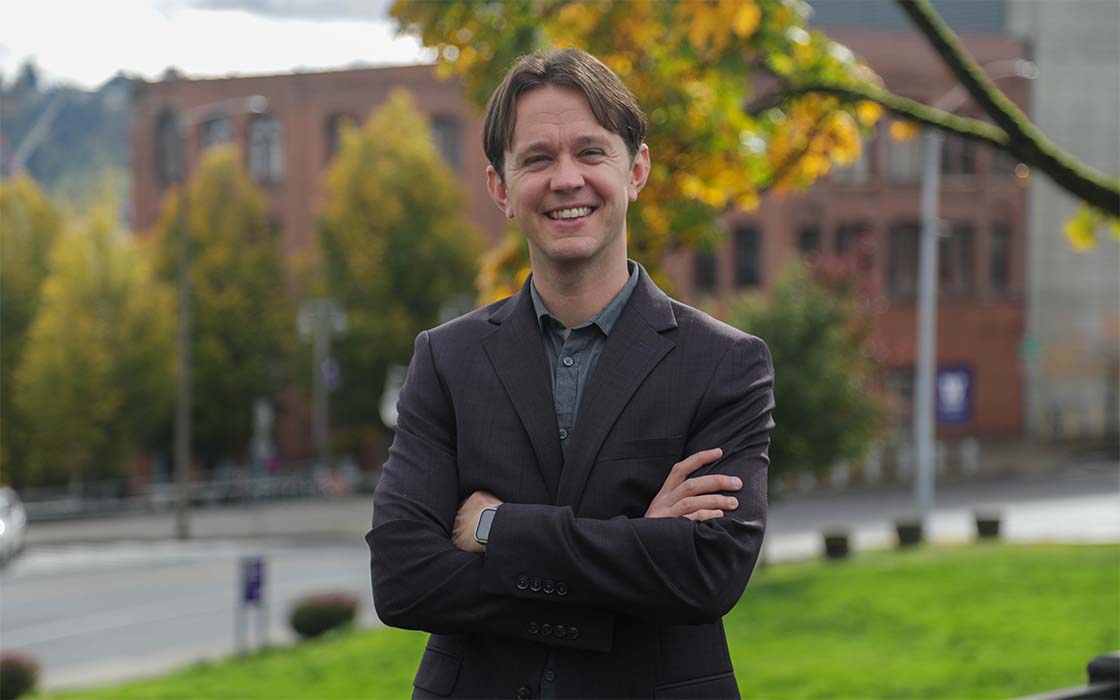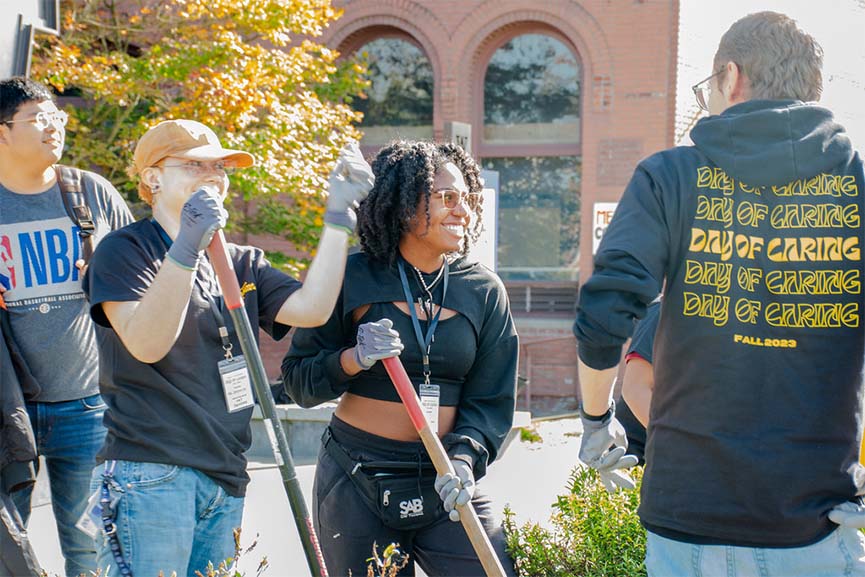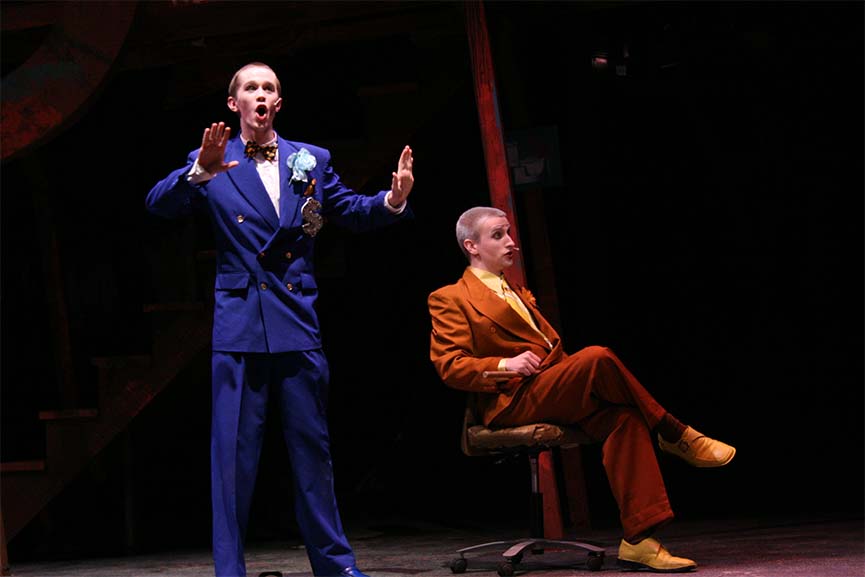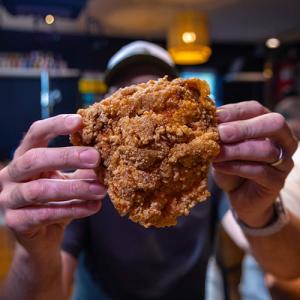
Building Connections and Community
As UW Tacoma's student involvement maestro, Conor Leary combines a flair for the programmatic with his desire to help students get the most out of their on-campus experience.
When Conor Leary was eight years old growing up in New Jersey, he knew that he was going to be a lawyer. “My family said I could argue really well, debate they called it,” Leary said. He even took the LSAT during his junior year in college, and did fairly well. “But by that time I had become an orientation leader, and gotten way more involved on a college campus.” It was an experience that shaped and changed him and led him down a different educational path.
Leary is now Director of Student Involvement & Leadership in Student Affairs at UW Tacoma, a job with a title as big as the job itself. He’s been at UW Tacoma since May 2020, starting as assistant director and then interim director, and was recently promoted. He worked previously at Fairleigh Dickinson University in New Jersey, where his last job was director for first-year experience. “I've always worked in higher education and student activities and involvement,” Leary said. “I decided that student engagement was my wheelhouse and one I wanted to kind of grow into.”
His experiences at Fairleigh Dickinson certainly cemented his belief in what he wanted to do professionally. “Focusing on the fact that my field is very multidimensional, I can spend time one-on-one with a student, helping them not just with programs and activities, but also the development of their skills, as well as what's going on outside of their institution,” Leary said. “But then I can also be planning a major event for campus, or finding ways to create hospitable and caring environments for those who may not have them off campus. So, there are just so many different challenges and dimensions to student engagement that I really enjoy.”
Leary said that he gets to perfect his own skills as well, whether in counseling or human resources, or event management and coordination. In his own college experience at Providence College in Rhode Island, he didn’t get involved in student activities, beyond his own classroom needs as an English and theater double major, until his junior year. “My schedule was very busy with theater rehearsals and performances, so I didn't really have too much time for going to student activities or board events, or being part of clubs and organizations,” Leary said. “That changed in my junior year when I became an orientation leader and learned a lot more from my other orientation leader team members about what other opportunities were out there.” It was those early experiences that drew Leary away from a career at the bar, or the theater, and into one in student involvement.
After his undergraduate work at Providence, Leary went on to earn two master’s degrees, one in education and guidance counseling, and the other in student services administration. “The counseling degree has definitely helped me in everything I do, recognizing that students are multifaceted and dimensional. People who come to school have a lot of priorities beyond classes to worry about,” he said.
Those other priorities, along with UW Tacoma’s reputation as a “commuter campus,” provided the first challenge for Leary in his position. “It's something that we, in the Center for Student Involvement, are always conscious of,” Leary said. “We make a point of trying things and putting them out there and getting students to commit to the idea that the campus is not just open when they have classes. They can stay. They can spend the day if they have the time.” The question then becomes, what kind of events will keep students on campus?
As the COVID-19 pandemic evolved and people began to return to campus, the other challenge that Leary faced was creating a sense of normalcy on campus, and making it an inviting place to be. “I want to give students reasons to be here other than their classes,” he said. In that effort, he has been able to collaborate with other groups on the campus. “So, some successful things we've seen are the return of some of our larger programming, such as block party, run by the student organizations. The student organizations themselves have been coming back a great deal more and are more active,” Leary said.

Other events in spring quarter 2023 that lured students back on campus past their class time were things like a casino night for the Pre-Medical Club, a luau held by the Pacific Islander Student Alliance, and the Oscars Award Ceremony, all on Friday nights. “Students have the time on a Friday night to hang out with each other and relax and enjoy a program,” Leary said.
Collaboration is ever-present in Leary’s job. “This quarter, we have 177 programs that we are promoting to the campus so far, just in the fall,” Leary said. “I've been telling students to put that side by side with their class schedule and see where they would be able to attend something because they're on campus, and then also identify the days that they might not be on campus, but want to be because there is a certain event they want to attend.”
Leary has larger plans for more student involvement on campus as well. “I think one of the things we're trying to roll out, in keeping with that concept of making sure campus is active, is working with groups to kind of stack programming on days where there's not usually much on campus, such as Fridays,” he said. Most students try to get away directly after their classes on Friday, so Leary and his team are pursuing ways to keep students engaged, such as the “Day of Caring” on Oct. 13, a service-oriented event which allowed students to get involved in campus service projects. That event was followed up by a comedy hypnotist event for those who wanted to attend, and that event was followed up by a dance hosted by the Vietnamese Student Association.
The Office for Student Involvement & Leadership is a reflection of Leary’s and his team’s passion. He said that his team is well-structured and focused on each of their own specific roles. Leary sees this as one of the keys to keeping an active and engaged student body. “It's always been my idea that I want to make sure that no matter why a student is coming to campus, they can find connection to something. We do a lot of forms of student engagement that can fit with whatever you have time for or whatever you're interested in,” he said.




